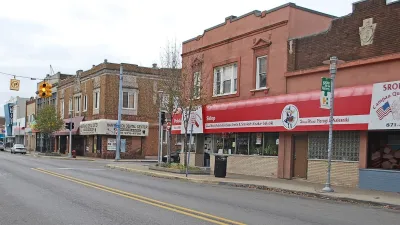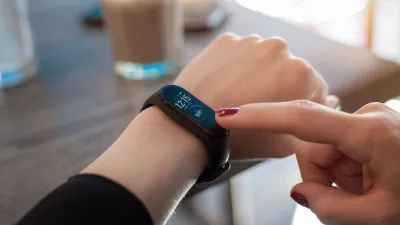Shopping for bulky items can be one of the challenges of living car free. Here are three of the best ways I've found for dealing with the problem.
I have spent about half my working life without a car- not just in New York where I now live, but in more auto-oriented cities such as Buffalo, Cleveland, Atlanta (for my first year or so there) and Jacksonville, Florida (for my first few months there). In those days, I would occasionally be asked: "But how do you deal with groceries"? In fact, I just read a newspaper column that seemed to lampoon concerns about walkability by raising the "how can you walk from the grocery store" trump card.
Admittedly, you can't carry as much in your hands as in a car- even if you save some strain on your hands by riding transit for part of the distance. But I personally have developed three ways of dealing with this problem. First, I sometimes just shop more often, and buy less food at a time. This worked best in Toronto, where there were lots and lots of grocery stores within walking distance of either my apartment or public transit. Similarly, in Queens I often employ this strategy because I love only a block and a half from a grocery store, and a few blocks from others.
Second, I have brought a suitcase or rolling cart to stuff groceries in (or alternatively, a really large trash bag). This strategy might look awkward, but seems more appropriate for longer trips when I want to buy more stuff (for example, if I am going to an unusual grocery store in another neighborhood, like Pomegranate in Brooklyn).
Third, I sometimes just buy a ton of groceries and take a taxicab home. This strategy works best in more auto-oriented cities like Jacksonville and Atlanta, where the nearest grocery is close enough for a cab ride to be relatively cheap, but far enough away that I wouldn't want to walk home with more than two or three grocery bags.*
*And to those of you who bicycle (which I don't): feel free to add your own thoughts.

Maui's Vacation Rental Debate Turns Ugly
Verbal attacks, misinformation campaigns and fistfights plague a high-stakes debate to convert thousands of vacation rentals into long-term housing.

Planetizen Federal Action Tracker
A weekly monitor of how Trump’s orders and actions are impacting planners and planning in America.

In Urban Planning, AI Prompting Could be the New Design Thinking
Creativity has long been key to great urban design. What if we see AI as our new creative partner?

Portland Raises Parking Fees to Pay for Street Maintenance
The city is struggling to bridge a massive budget gap at the Bureau of Transportation, which largely depleted its reserves during the Civd-19 pandemic.

Spokane Mayor Introduces Housing Reforms Package
Mayor Lisa Brown’s proposals include deferring or waiving some development fees to encourage more affordable housing development.

Houston Mayor Kills Another Bike Lane
The mayor rejected a proposed bike lane in the Montrose district in keeping with his pledge to maintain car lanes.
Urban Design for Planners 1: Software Tools
This six-course series explores essential urban design concepts using open source software and equips planners with the tools they need to participate fully in the urban design process.
Planning for Universal Design
Learn the tools for implementing Universal Design in planning regulations.
Gallatin County Department of Planning & Community Development
Heyer Gruel & Associates PA
JM Goldson LLC
City of Camden Redevelopment Agency
City of Astoria
Transportation Research & Education Center (TREC) at Portland State University
Jefferson Parish Government
Camden Redevelopment Agency
City of Claremont






























